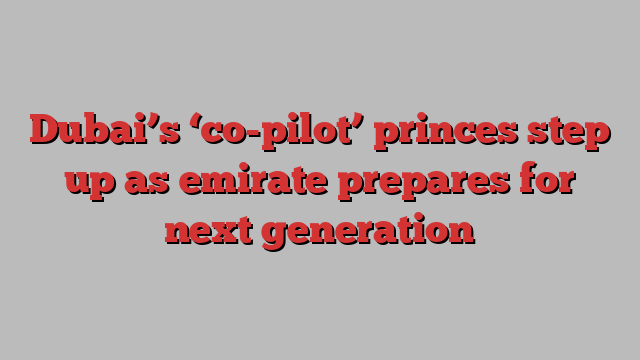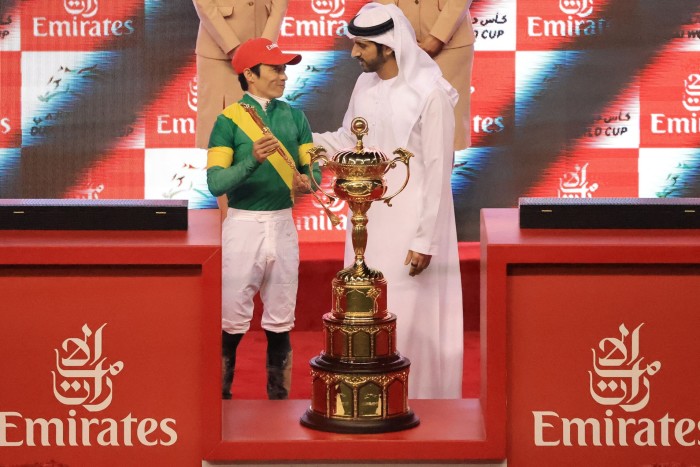
Dubai crown prince Sheikh Hamdan bin Mohammed al-Maktoum has won popularity at home for his thrill-seeking pursuits, from leading mass-participation runs and cycle events to scaling the city’s Burj Khalifa tower.
His younger brother Sheikh Maktoum keeps a lower profile, preferring to eschew the limelight as he cultivates the image of an astute technocrat.
Dubai’s ruling family is counting on the brothers’ different qualities to maintain the development of an emirate that has evolved over the decades from an entrepôt port to a global trade, tourism and financial centre.
Their abilities are moving more into focus as their father, Dubai ruler and United Arab Emirates prime minister Sheikh Mohammed bin Rashid al-Maktoum, gradually steps back from frontline decision-making. The 75-year-old is now regularly photographed walking with a cane, as the ground is prepared for the eventual succession of Hamdan.
“Sheikh Mohammed’s still in the driver’s seat,” said Abdulkhaleq Abdulla, a Dubai-based political scientist. “But the co-pilots have taken more responsibility.”
Hamdan, 41, and Maktoum, 40, were in their 20s when they were appointed heir apparent and deputy ruler respectively, with a view to eventually taking over the day-to-day running of Dubai from their father.
“Hamdan is seen as the chief marketing officer [in charge of] new investments, tourism and promoting Dubai,” said one emirate-based chief executive. “Maktoum is the money man, he’s more serious.”
The succession planning moved up a gear in July as Hamdan joined the federal government as deputy prime minister. He also stepped into the largely ceremonial role of defence minister held by his father since 1971. Maktoum has been UAE finance minister and a deputy prime minister since 2021.
The brothers’ partnership is part of a new generation of leaders emerging in the Gulf. After Abu Dhabi’s Sheikh Mohamed bin Zayed al-Nahyan became UAE president last year he appointed his eldest son Sheikh Khaled as crown prince and promoted his own brothers.
Managing the power balance between Abu Dhabi, the cash-rich Emirati capital, and the more entrepreneurial Dubai is a task that will increasingly rest on the shoulders of the younger cohort.

Dubai’s latest revival started amid the coronavirus pandemic after it reopened its tourism and services-based economy faster than other cities.
The highest profile of the seven emirates that make up the UAE, the city became a magnet for wealthy tech and crypto investors, social media influencers and remote workers fleeing lockdowns elsewhere. Moscow’s invasion of Ukraine in 2022 sparked a further influx of Russians relocated by multinational companies, seeking to avoid the impact of western sanctions, or avoid the draft.
Dubai’s total population grew 9 per cent between 2019 and 2023, according to government estimates, hitting 3.7mn. The expanding ranks of expatriates helped generated Dubai’s third property surge this century, following the growth of the early 2000s.
That earlier boom ended nine years later amid the global financial crisis, when Dubai used more than $20bn in bailout loans from Abu Dhabi to avoid default. During the Arab uprisings of 2011, Dubai was seen as a safe haven for regional wealth, sparking a growth spurt that lasted until oil prices collapsed in 2014.
Maktoum, the “money man”, has been quietly using the proceeds from privatisations and growing tax revenues to pay down Dubai’s estimated $100bn-plus in bonds and loans — built up during the debt-fulled boom of the 2000s — and put the emirate’s finances on a more sustainable footing.
Some of this has come from Dubai’s capital markets strategy, through which it is listing state-related entities to boost liquidity and compete more effectively with larger bourses in Saudi Arabia and Abu Dhabi.
When he took effective power in 1995, Sheikh Mohammed turned Dubai into a global metropolis by boosting trade, developing infrastructure to attract investment and opening up new sectors in real estate, media and finance.
Sheikh Mohammed’s advisers continue to wield influence, but they are gradually being eclipsed by Hamdan and Maktoum aides such as Mohammed al-Hussaini, minister of state for financial affairs, and Helal al-Marri, who heads Dubai’s economic and tourist departments.
“Hussaini reflects prudence, financial management and discipline,” said Nasser al-Shaikh, former director-general of Dubai’s department of finance. “Marri reflects the growth agenda.”
Hussaini is a board member at Dubai’s national bank Emirates NBD and the $320bn Investment Corporation of Dubai that oversees state holdings in the city’s leading companies.
At the finance ministry, he is overseeing the UAE’s introduction of a 9 per cent corporate tax rate, which along with the sales tax of 5 per cent introduced in 2018 is expected to bring the government substantial revenues. However, analysts have warned that the levies will need careful management to avoid deterring investors previously attracted by the country’s tax-free status.
Marri, who is also on the ICD board, chairs the domestic stock market and is leading Dubai’s drive to become a cryptocurrency hub and to double the economy’s size by 2033.
The UK-trained chartered accountant, who has worked at KPMG and McKinsey, is seen as a bridge into the international business community. “When you have an issue, you go to Helal,” said a senior banker.
Yet although many Emiratis acknowledge the new leadership’s effectiveness and commitment to fiscal prudence, the new era has ushered in an air of uncertainty.
“This feels like limbo,” said an Emirati businessman. “There’s a lot of confidence in them, but the new crew are also somewhat unknown.”
And despite the brothers’ growing influence, many businesspeople still believe it is their father who calls the shots. As one Dubai magnate said: “Sheikh Mohammed’s still in charge”.